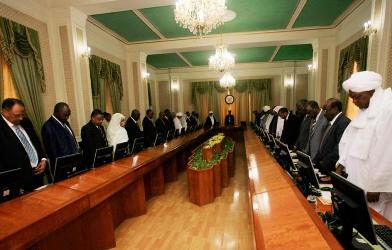Austerity Plan: Sudan’s NCP bracing for 30% reduction of government size
June 6, 2012 (KHARTOUM) – The governing National Congress Party (NCP) in Sudan has decided to relinquish 30 percent of its representation in both executive and legislative authorities nationwide as part of austerity measures the federal government intends to apply in order to salvage the country’s ailing economy.

The NCP dominates both the legislative and executive branches of Sudan’s federal government, including the 345 member parliament and the 31 portfolio cabinet. There are a handful of other political parties participating in the cabinet, the most notable of which is the Democratic Unionist Party (DUP) of Mohammed Osman Al-Mirghani.
The move to cut government size appears to be intended to reduce the anticipated public reaction to the NCP’s recent decision to lift fuel subsidies.
The source, who asked not to be named, said that he expects the decision to be announced officially next week. He added that NCP and government officials had agreed to the plan as part of efforts to confront what he described as the hardest experience the ‘salvation government’ is enduring since it took power 23 years ago.
The source further revealed that NCP leaders are in fear over possible street protests as the dire economic situation worsens further. He pointed out that the planned reduction would extend beyond the federal government to include executive and legislative branches of state governments.
He also added that the decision to reduce the government size would be announced before the execution of plans to lift fuel subsidies in order to mitigate potential public reaction to the cutting of fuel subsides.
Sudan’s economy went into deep recession following the loss of nearly 75 percent of the country’s oil resources when South Sudan seceded in July 2011.
Inflation has been on the rise, hitting 30 percent in May, mainly on food prices which continue to increase as the local currency depreciates due to the fact that the country’s reserves of hard currency were sharply curtailed following the loss of oil revenues.
NCP critics accuse it of having an inflated government whose spending is out of proportion with the country’s economic situation.
After resisting the finance minister for five months, NCP’s parliamentary bloc endorsed last week a plan to lift fuel subsidies. In return, they demanded a number of measures to mitigate its effects.
The MP’s asked to reduce the number of ministers to 25, cut the privileges of constitutional post-holders. They also asked to sack the minister of finance Ali Mahmood Abdel-Rasool on account of his responsibility for a number of wrong economic policies.
Meanwhile, NCP’s leadership organised a briefing at the party’s headquarters in the capital Khartoum on Wednesday and informed the party’s rank and file of the austerity measures that will be taken.
The NCP member and minister of finance Ali Mahmood said at a briefing at the party’s headquarters that the government’s plan to cut expenditure includes elimination of allocated funds to government buildings, a moratorium on importing government vehicles, hiking salaries of state employees, reduction of cabinet, imposition of greater taxes on telecommunication companies and retention of subsidisation of consumer products.
He added that they recommended to the president that the cabinet be reduced first before applying the decision to lift fuel subsidies.
The minister said that the increases in the price of fuel would be compensated by increases in salaries. He also announced plans to cut privileges of state officials, declaring that no minister would be able to go to Haj or Muslim pilgrimage on government fund and that every minister would be given one car only. “The era of the Madame car is no more”.
Ali Mahmood said that introducing these reforms would enable the Sudanese economy to recover “in one year or less”, he however warned that these austerity measures must be fully implemented or else the economy would end up grappling with a scarcity of basic commodities. “We will not let the country meet such fate”.
The NCP’s deputy chairman Nafie Ali Nafie said on Wednesday that economic reforms had become a necessity that cannot be delayed if the Sudanese economy is to be stabilised. “We will not be like ostriches burying our heads in sand. The government will reward the people with bold measures”.
Addressing the same briefing, Nafie accused opposition parties of creating panic over the NCP’s decision to lift fuel subsidies but he vowed to show no leniency in doing what’s necessary. He further threatened that they would crackdown on those dreaming of a regime collapse due to the lifting of fuel subsidies.
(ST)
